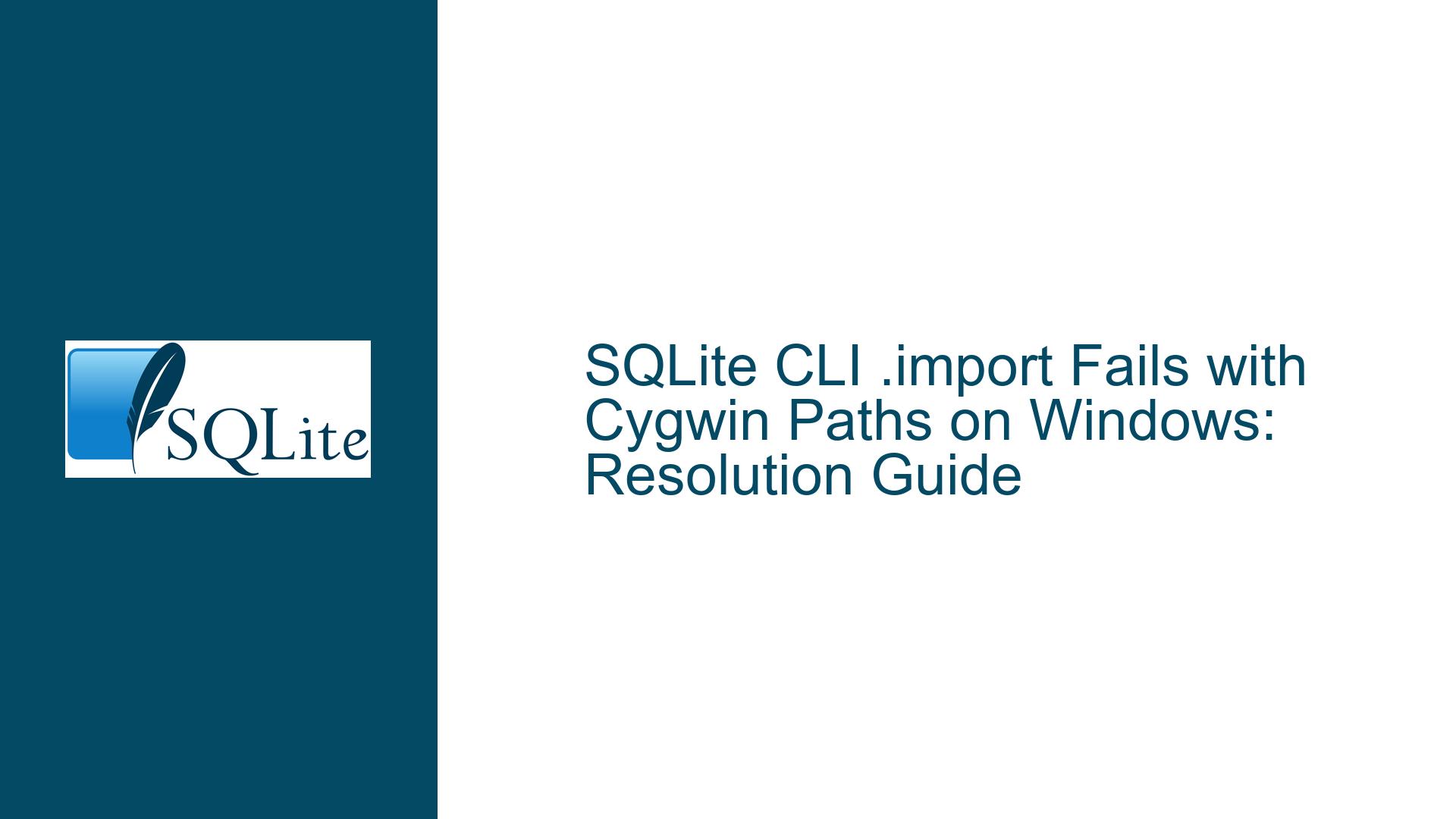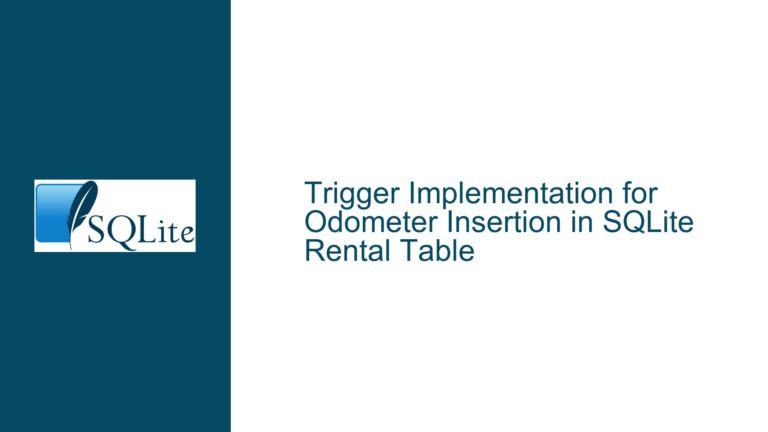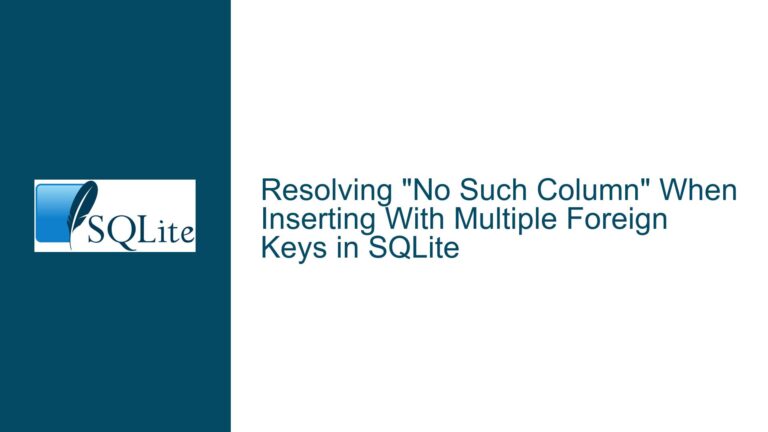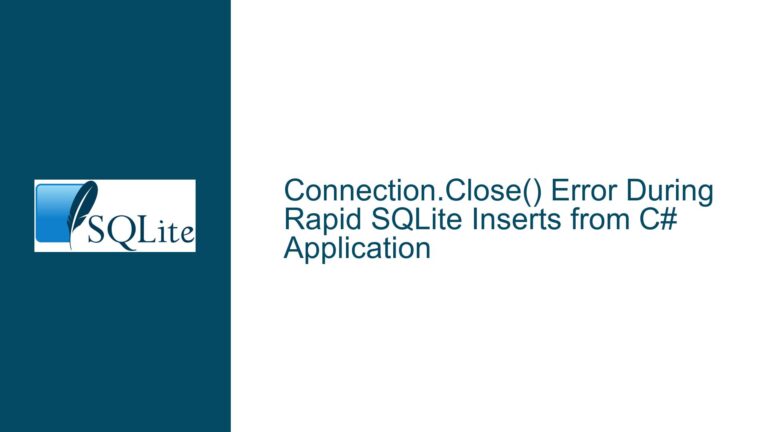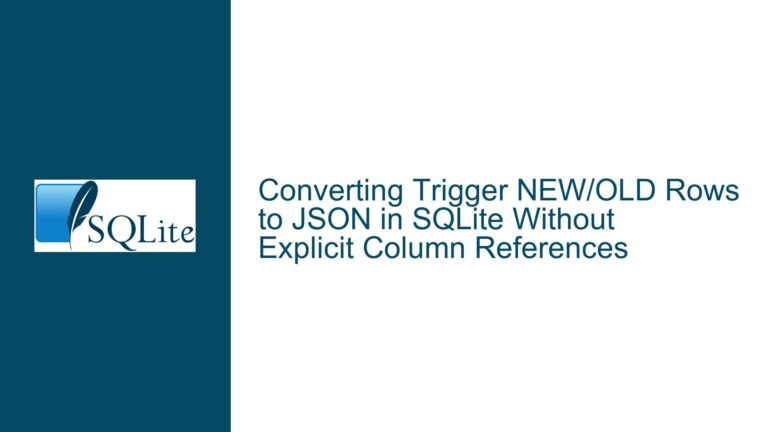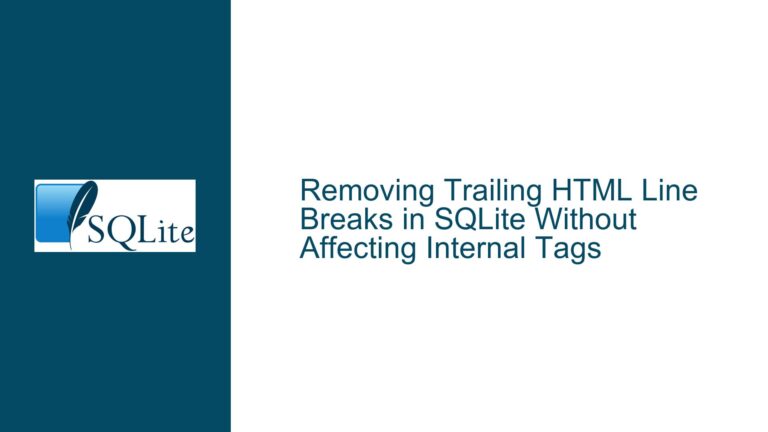SQLite CLI .import Fails with Cygwin Paths on Windows: Resolution Guide
Cygwin Path Translation and SQLite CLI File Handling Mismatch
The core issue arises when using the SQLite Command Line Interface (CLI) within a Cygwin environment on Windows 10. The .import command fails to recognize file paths formatted in Cygwin’s Unix-style convention (e.g., /cygdrive/c/...), while the same operation succeeds when using native Windows paths (e.g., c:/...). This discrepancy stems from fundamental differences in how Cygwin and native Windows applications resolve file paths. Cygwin emulates a POSIX-compliant environment, translating Unix-style paths to their Windows equivalents. However, the SQLite CLI obtained directly from the SQLite website is compiled as a native Windows application. Native Windows binaries do not inherently understand Cygwin’s path translation layer, leading to "file not found" errors when attempting to access files via Cygwin-style paths. The conflict between Cygwin’s abstraction and the SQLite CLI’s reliance on the Windows file API creates a compatibility gap that must be bridged through environment-specific configurations or alternative tooling.
Native Windows SQLite CLI vs. Cygwin Environment Integration
The root cause of the .import failure lies in the interaction between the SQLite CLI’s compilation target and Cygwin’s path resolution mechanics. When the SQLite CLI is compiled for native Windows (as is the case with the official precompiled binaries from sqlite.org), it uses the Windows C runtime’s file handling functions (e.g., fopen()). These functions expect paths in Windows-native format (e.g., C:\Users\... or C:/Users/...). Cygwin, however, provides a compatibility layer that allows Unix-style paths (e.g., /cygdrive/c/Users/...) to be resolved to their Windows equivalents. This translation occurs within Cygwin’s DLLs and is invisible to native Windows applications. Consequently, when a Cygwin user invokes the native Windows SQLite CLI, the Cygwin terminal passes the Unix-style path verbatim to the CLI, which then attempts to open the path using Windows-native APIs. Since /cygdrive/c/... is not a valid Windows path, the operation fails.
A deeper technical layer involves the distinction between "Cygwin-aware" and "native" executables. Cygwin-compiled applications link against the cygwin1.dll library, which intercepts file operations and translates paths. Native Windows executables, including the official SQLite CLI, bypass this layer entirely. The mismatch becomes apparent when mixing Cygwin shell environments with non-Cygwin binaries. Users expecting Cygwin’s path abstraction to apply universally may overlook the fact that native Windows applications operate outside Cygwin’s POSIX emulation.
Strategies for Resolving Cygwin Path Compatibility in SQLite CLI Operations
1. Use Native Windows Paths in Cygwin-Terminal Sessions
The simplest workaround is to replace Cygwin-style paths with their native Windows equivalents when invoking the SQLite CLI. For example:
sqlite3 database.db ".import c:/Users/dougf/downloads/allCountries.txt geoname"
Cygwin’s shell allows mixed path formats, and the native Windows SQLite CLI will correctly resolve c:/... paths. This approach avoids reliance on Cygwin’s path translation and ensures compatibility with precompiled SQLite binaries.
2. Leverage cygpath for Automated Path Conversion
The cygpath utility converts between Cygwin and Windows path formats. Integrate it into command invocations to dynamically translate paths:
sqlite3 database.db ".import '$(cygpath -w /cygdrive/c/Users/dougf/downloads/allCountries.txt)' geoname"
The -w flag instructs cygpath to output a Windows-style path. Enclosing the command substitution in single quotes ensures proper handling of spaces. While effective, this method introduces complexity and potential quoting issues in scripts.
3. Install or Compile a Cygwin-Compatible SQLite CLI
Cygwin’s package repository includes a version of SQLite3 compiled for the Cygwin environment. Install it via:
apt-cyg install sqlite3
This version links against cygwin1.dll, enabling it to resolve Cygwin-style paths. However, the Cygwin-provided SQLite3 may lag behind the official release (e.g., version 3.34.0 vs. 3.40.1). To obtain the latest version with Cygwin compatibility:
- Install Cygwin development tools (
gcc-core,make,libexpat1-devel). - Download the SQLite source amalgamation from sqlite.org.
- Compile it within Cygwin:
gcc -O2 -I. -DSQLITE_ENABLE_FTS5 shell.c sqlite3.c -o sqlite3 -ldl -lm
The resulting sqlite3.exe will recognize Cygwin paths but retain full Windows filesystem integration.
4. Alternative: Use Windows Subsystem for Linux (WSL)
For users requiring consistent Unix-style path handling, migrating to WSL eliminates Cygwin’s hybrid environment complexities. WSL provides a full Linux kernel and filesystem, where paths like /mnt/c/Users/... map to Windows drives. The SQLite CLI in WSL (installed via sudo apt install sqlite3) operates natively within Linux, avoiding path translation issues entirely.
5. Modify Workflows to Avoid Path Ambiguity
Standardize on a single path format across all tools in the workflow. For example:
- Use native Windows paths when working with native Windows applications (e.g., SQLite CLI from sqlite.org).
- Use Cygwin paths only when interacting with Cygwin-compiled tools.
Scripts can detect the execution environment (Cygwin vs. native CMD) and adjust paths dynamically using conditional logic andcygpath.
Detailed Analysis of Path Handling Across Environments
Cygwin’s Path Translation Mechanism
Cygwin implements a virtual filesystem where /cygdrive/c corresponds to C:\, /cygdrive/d to D:\, and so on. This translation is managed by the cygwin1.dll runtime, which intercepts POSIX-style system calls and remaps them to Windows API calls. For Cygwin-compiled applications, this process is seamless. However, native Windows applications—including the SQLite CLI from sqlite.org—do not load cygwin1.dll and thus cannot resolve /cygdrive paths.
SQLite CLI File Access Internals
The .import command in the SQLite CLI uses the fopen() function from the C standard library. In native Windows builds, fopen() expects paths formatted according to Windows conventions. Even when invoked from a Cygwin shell, the native SQLite CLI does not receive the translated Windows path; it receives the literal /cygdrive/c/... string, which fopen() cannot resolve.
Compilation Environment Implications
Compiling SQLite3 within Cygwin links it against cygwin1.dll, enabling path translation. The resulting binary accepts both Cygwin and Windows paths, as cygwin1.dll intercepts file operations and applies necessary translations. This dual compatibility comes at the cost of tying the binary to the Cygwin environment—a trade-off that may not be desirable for all users.
Best Practices for Cross-Platform SQLite CLI Usage
Explicit Path Formatting
Always use native Windows paths when working with native Windows SQLite CLI binaries. In Cygwin, this can be done manually or viacygpath -w.Environment-Specific Toolchains
Maintain separate SQLite CLI installations for Cygwin and native Windows environments. Use Cygwin’s package manager for Cygwin-compiled tools and reserve the official SQLite.org binaries for native CMD/PowerShell sessions.Script Portability Considerations
Write scripts to detect their execution environment and adjust paths accordingly. Example in Bash:if [[ $(uname -o) == Cygwin ]]; then WIN_PATH=$(cygpath -w "$UNIX_PATH") else WIN_PATH="$UNIX_PATH" fi sqlite3 database.db ".import '$WIN_PATH' table"Avoid Mixed-Environment Workflows
Minimize interactions between Cygwin and native Windows applications. When unavoidable, use intermediary tools likecygpathto bridge path format gaps.
Conclusion
The .import command’s failure to resolve Cygwin-style paths in the SQLite CLI stems from the native Windows binary’s inability to interpret Cygwin’s POSIX path translation. Resolution strategies include using native paths, leveraging cygpath for conversion, compiling a Cygwin-aware SQLite CLI, or transitioning to WSL. By understanding the interplay between Cygwin’s emulation layer and Windows file APIs, users can adopt workflows that mitigate path compatibility issues while maintaining access to the latest SQLite features.
